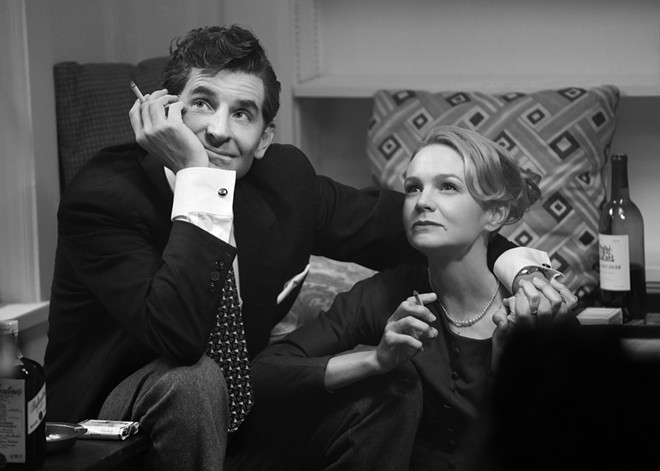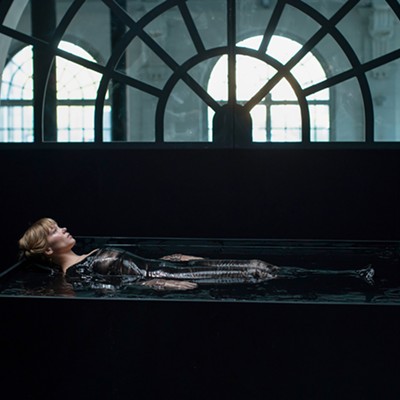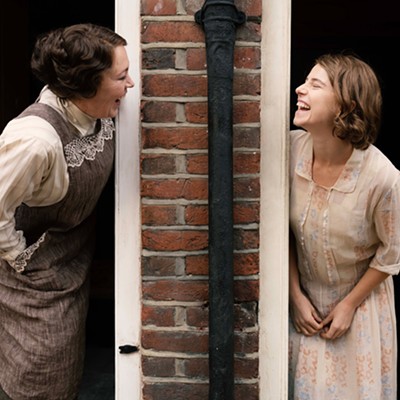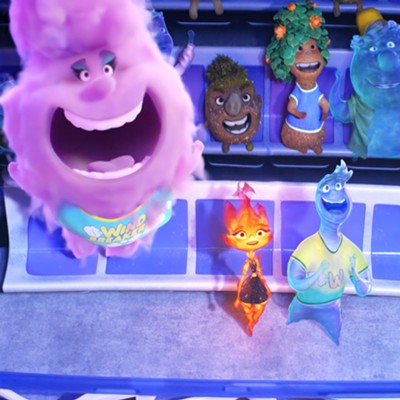Oh, frabjous film! What a movie. What an experience. Bradley Cooper's second feature as co-writer and director (after 2018's A Star Is Born) is a marvel: passionate, intoxicating, enrapturing. It's an astonishing cinematic high-wire act that feels classic and modern at the same time.
Maestro is nominally a biopic docudrama, but it doesn't feel like any you've seen before. I didn't know much about classical-music composer and orchestral conductor Leonard Bernstein before Maestro, and I didn't learn many facts about him in this movie, and that's OK! "It's not a documentary!" is the usual reminder when some folks complain about omissions or elisions in movie depictions of real people. Cooper and his co-screenwriter Josh Singer have leaned into that, so much so that they're not even pretending to be documentary-ish. The way they tell the story of Bernstein here is immersive — we are there for Bernstein's professional and personal life in postwar America — but also impressionistic: Nothing is explained for us, we just let it flow over us.
There's one brief mention, for instance, of a friend called Jerry... and it was only later that I realized that, oh, that was Jerome Robbins, the director, producer, and choreographer of West Side Story (for which Bernstein wrote the music). Maybe there's a brief passing mention of Stephen Sondheim, who wrote the lyrics for that production? I can't really recall. Anyone hoping for a box-ticking list of Bernstein's notable collaborators will be disappointed.
After a brief opener where an elderly Bernstein reflects on artistic inspiration in a late-1980s interview, Cooper throws us straight into the deep end of the man's early life. At a postwar '40s party for the smart cultural set in the New York City metro area, he meets the woman who will become his wife, actress Felicia Montealegre (Carey Mulligan). From then on, we're split between other parties — another one in the '60s plays a crucial role in telling the tale of the romance between Bernstein and Montealegre — and rehearsals, performances or quiet moments with family... but Cooper never holds our hands. We enter conversations midstream, but we grasp what is going on: This is the vital, energetic life of creative folks, intellectual but also earthy. There's a bit of flirtation, a bit of sex, but even these moments of titillation are rooted in brainy creativity.
This is a tale less of one man's creative output — there's lots of Bernstein's music on the soundtrack, but not much of it is diegetic (actually heard in the context of the story being told) — and more of what drove Bernstein artistically. A lot of that was love for the public people around him, foremost Montealegre. And a lot of it was also love for the people he had to sneak around to see: Bernstein was gay, or at least bisexual, and wasn't very good at pretending he wasn't (apart from the bare minimum to keep up public appearances in those homophobic days).
And yet this is emphatically not another story that upholds the damaging cultural notion that noble sacrifice in support of a Great Man is a good thing. There's a brief moment in which musician David Oppenheim (Matt Bomer), Bernstein's friend and one-time lover, suddenly realizes that he will never be the center of Bernstein's life. Not a word is spoken, but the look on Bomer's face is heartbreaking. And that is nothing next to Felicia's journey, as she slowly comes to terms with what she has denied herself — such as a husband wholly devoted to her — in order to be in Bernstein's thrall. Mulligan's performance is delicate, seething with sorrow, and yet the film doesn't dare cast her as a victim, either. The lament here is that the world loses things, ones we aren't even aware we've lost, when we try to crush huge spirits like Bernstein's — and like Felicia's — into tiny boxes.
Cooper's portrayal of Bernstein is sublime, utterly disappearing into the role to the point where he's often unrecognizable. He seems to have taken onboard Bernstein's unflappable confidence, and it is a delight to watch. There's a bewitching scene late in the film in which Bernstein conducts a concert in a cathedral: It roils with passion and joy, and soars like the music itself. Perhaps no single other element of the film sings as much with Bernstein's — and Cooper's — power.
Bernstein's compositions are eclectic, staccato, genre-defying, full of unexpected tonal shifts that nevertheless work. Maestro echoes its subject's music. There's a visual and narrative freshness to this movie, a wonderful eccentricity, a delicious audacity. They're all a kick in the pants to a mainstream cinema that has, in many ways, been feeling more and more moribund. This is a perfect movie, but hopefully those who don't agree would at least recognize that it pushes boundaries in a way that we very much need right now.
























